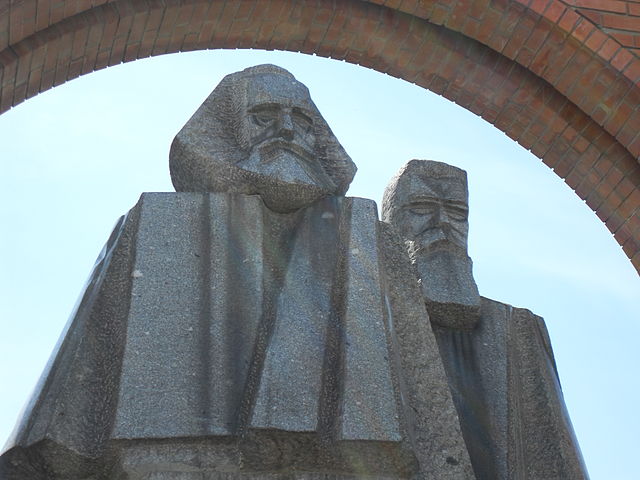
The
bicentennial of Karl Marx’s birth has occasioned a surge of interest in the man’s work, complete with the
unveiling of a statue in his hometown of Trier, Germany.
At a celebration of Marxism in Beijing last week, Chinese President Xi Jinping
declared that, ‘like a spectacular sunrise, the theory illuminated the path of humanity’s exploration of the law of history, and humanity’s search for [its] own liberation’. He would go on to claim that Marx ‘pointed out the direction, with scientific theory, toward an ideal society with no oppression or exploitation, where every person would enjoy equality and freedom’.
Given that Xi’s words were uttered in ‘Marxist’ China, those in attendance had no choice but to agree with them. Yet, speaking in Trier on the same day, European Commission President
Jean-Claude Juncker offered a somewhat generous appraisal of his own:
Today he stands for things which is he not responsible for and which he didn’t cause, because many of the things he wrote down were redrafted into the opposite.
It is not entirely clear what Juncker meant by this. Marxism, after all, has inflicted untold misery on tens of millions of people who have been forced to live under regimes waving its banner. For much of the 20th century, 40% of humanity suffered famines, gulags, censorship and other forms of repression at the hands of self-proclaimed Marxists.
In his speech, Juncker seemed to be alluding to the standard counterargument: that communist atrocities throughout the 20th century were due to some sort of distortion of Marx’s thought, for which the man himself can scarcely be held responsible.
Is there anything to this argument? Marx spent most of his life analysing the political economy of the industrialising mid-19th–century West. But his enduring relevance owes more to his ideas for the future, and the implications they would have for society. In considering his legacy, this area of his thought cannot be ignored.
Marx regarded private property as the source of all evil in the emerging capitalist societies of his day. Accordingly, he believed that only by abolishing it could society’s class divisions be healed, and a harmonious future ensured. Under communism, his collaborator Friedrich Engels later
claimed, the state itself would become unnecessary and ‘wither away’. These assertions were not made as speculation, but rather as scientific claims about what the future held in store.
But, of course, it was all rubbish, and Marx’s theory of history—dialectical materialism—has since been proved wrong and dangerous in practically every respect. The great 20th-century philosopher Karl Popper, one of Marx’s strongest critics, rightly called him a ‘false prophet’. And, if more evidence were needed, the countries that embraced capitalism in the 20th century went on to become democratic, open and prosperous societies.
By contrast, every regime that has rejected capitalism in the name of Marxism has failed—and not by coincidence or as a result of some unfortunate doctrinal misunderstanding on the part of Marx’s followers. By abolishing private ownership and establishing state control of the economy, one not only deprives society of the entrepreneurship needed to propel it forward; one also abolishes freedom itself.
Because Marxism treats all contradictions in society as the products of a class struggle that will disappear when private property does, dissent after the establishment of communism is impossible. By definition, any challenge to the new order must be an illegitimate remnant of the oppressive order that came before.
Thus, Marxist regimes have in fact been logical extensions of his doctrines. Of course Juncker is right that Marx—who died 34 years before the Russian Revolution—was not responsible for the Gulag, and yet his
ideas clearly were.
In his landmark three-volume study
Main currents of Marxism, the Polish philosopher Leszek Kołakowski, who became a leading critic of Marxism after having embraced it in his youth, notes that Marx showed almost no interest in people as they actually exist. ‘Marxism takes little or no account of the fact that people are born and die, that they are men and women, young or old, healthy or sick,’ he
writes. As such, ‘Evil and suffering, in his eyes, had no meaning except as instruments of liberation; they were purely social facts, not an essential part of the human condition.’
Kołakowski’s insight helps to explain why regimes that have embraced Marx’s mechanical and deterministic doctrine inevitably must turn to totalitarianism when confronting the reality of a complex society. They have not always fully succeeded; but the results have always been tragic.
For his part, Xi views China’s economic development over the past few decades as ‘cast iron proof’ of Marxism’s continued validity. But, if anything, it is exactly the other way around. Remember that it was the China of pure communism that produced the famine and terror of the ‘Great Leap Forward’ and the ‘Cultural Revolution’. Mao’s decision to deprive farmers of their land and entrepreneurs of their firms had predictably disastrous results, and the Communist Party of China (CPC) has since abandoned that doctrinaire approach.
Under Mao’s successor, Deng Xiaoping, the CPC launched China’s great economic ‘opening-up’. After 1978, it began to restore private ownership and permit entrepreneurship, and the results have been nothing short of spectacular.
If China’s development is being held back by anything today, it is the remnants of Marxism that are still visible in inefficient state-owned enterprises and the repression of dissent. China’s centralised single-party system is simply incompatible with a modern and diverse society.
Two hundred years after Marx’s birth, it is certainly wise to reflect on his intellectual legacy. We should do so not in celebration, however, but to inoculate our open societies against the totalitarian temptation that lurks in his false theories.
 Print This Post
Print This Post